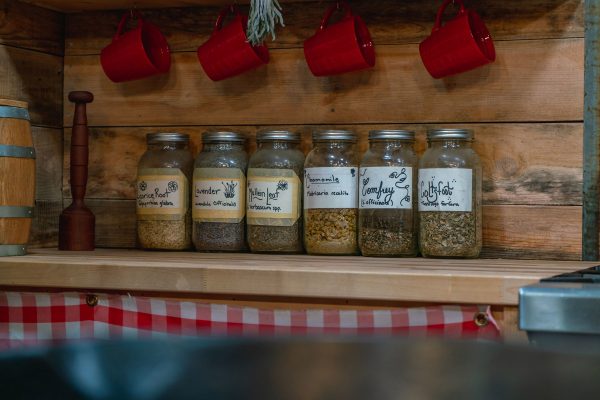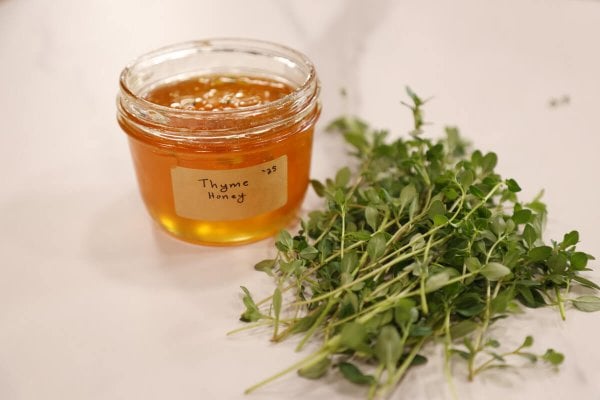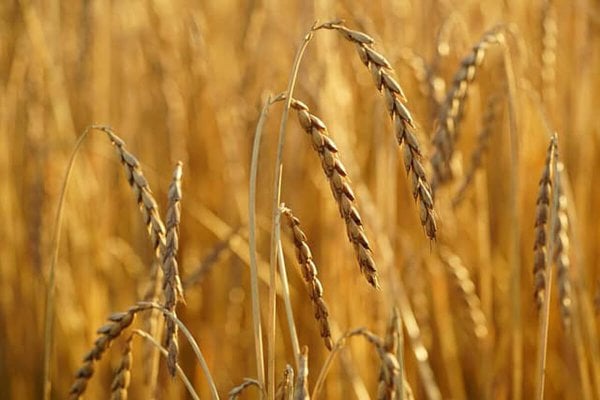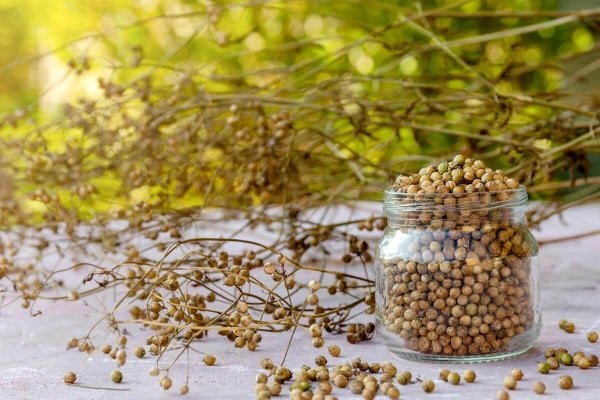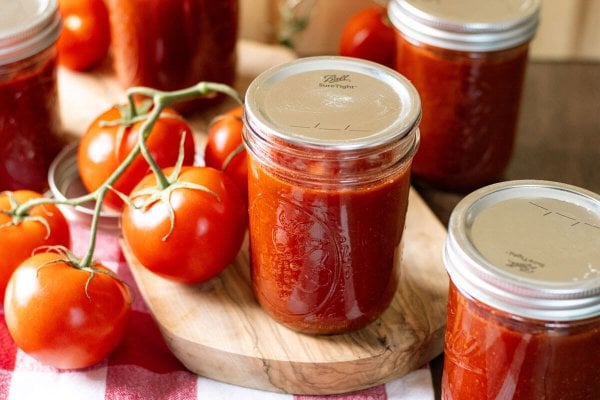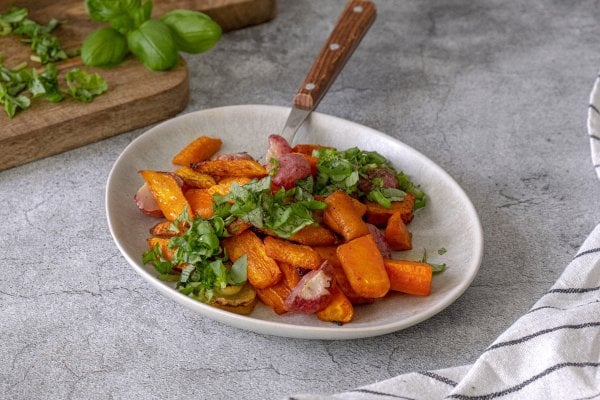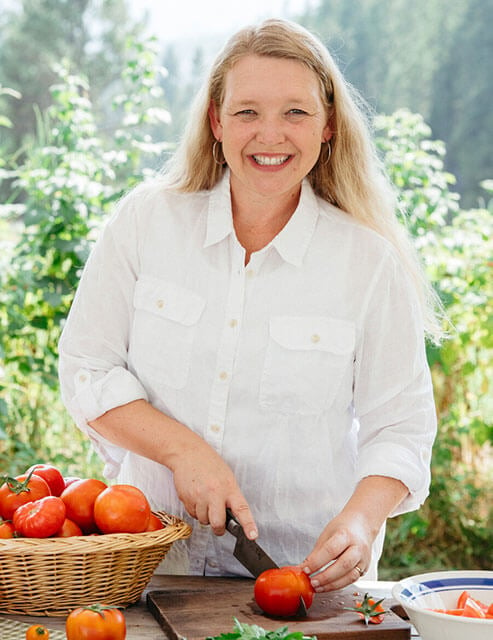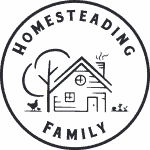Welcome to the first episode of Pantry Chat! Josh and Carolyn have taken their popular YouTube series and turned it into a podcast so you can get all your homesteading tips on the go.
If you’re new to the Homesteading Family, welcome!
Josh and Carolyn were living the “normal” life, pursuing their careers and doing the daily commute in Los Angeles, while living in a tiny apartment with only a couple small herb gardens and some tomato plants. It didn’t take long for them to realize that they wanted a different life and more sustainability for their family after the birth of their first child.
But they didn’t just make the move from the city to 40 acres in Idaho overnight. As beginner homesteaders, it was a process that took time for them to refine their homesteading skills and prepare them for each new season of their journey.
How did they do it and what are the things you need to consider when looking at making the shift to a homesteading lifestyle? What do you need to know when buying a homestead?
In this episode:
- Josh and Carolyn talk about why they made the move from the city to the country 18 years ago.
- How they honed their homesteading skills in the early years.
- How to fill up the space you have now and be resourceful before moving on to something bigger.
- How to be strategic, ask the right questions and make the right decisions when starting to grow your own food.
- What is clabbered milk and how can you reuse the cultures to speed up your process.
Resources:
More Pantry Chat Episodes
- Introducing Pantry Chat Podcast
- How to Get Started Homesteading
- When Good Enough is Perfect
- The Family Economy
- 7 Things You Must Do On Your New Homestead
- How to Pivot When Things Go Wrong on the Homestead
- Tips for Butchering Meat
- Prepping Your Pantry for Winter
- Josh and Carolyn Answer Your Questions
- Pantry Chat Q & A – Episode #74
- Pantry Chat Q & A – Episode #47
Josh: Hey, you guys. This is Josh.
Carolyn: And Carolyn.
Josh: With Homesteading Family and welcome to the first episode of our brand new podcast, Pantry Chat Food For Thought.
Carolyn: Today we're going to be talking about how we went from living in the city to homesteading on 40 acres in Idaho.
Josh: This week's episode of The Pantry Chat is brought to you by BCS Two-Wheel Tractors. Now you may have already heard of the legendary versatility of BCS two-wheel tractor for small farms and homesteads. We love ours here on River Bend. It's the most efficient and time-saving choice for a small acreage. Building raised beds with a rotary plow attachment, mixing in soil amendments with the power arrow and shredding cover crops in place with the flail mower. But a BCS two-wheel tractor is more than just a gardening tool.
BCS powers more than 40 high-quality PTO-driven attachments each with the power and performance of an all gear drive transmission. Blow snow with the BCS's snow thrower. Chip and tread limbs and sticks with the chipper shredder. Clean up your property with the pressure washer. All up to 1100 pounds, including yourself with the ride on utility tractor and even spread compost over 30-inch beds with the spreader attachment. Yep, BCS is pretty much the Swiss army knife of power equipment for your homestead.
Check out bcsamerica.com to see the full range of tractors and attachments and find your nearest BCS dealer today. That's bcsamerica.com.
All right, well, today is an exciting day.
Carolyn: Yeah. This has been in the making for a while, but now we have the first episode of the podcast version of The Pantry Chat.
Josh: So if you were new with us here today, we have actually been doing The Pantry Chat on video for over a year now.
Carolyn: Yes, we've got a lot. I think we've up to 56 episodes or something like that out on video on The Pantry Chat.
Josh: I think so, but we know that a lot of viewers and a lot of folks wanted to get this on an audio only version, so that you could take us on the go. So this is really exciting. Welcome. Those of you that are brand new to The Pantry Chat, we're excited to have you here.
Carolyn: Yes, but if you've been joining us for a long time on video, know that the video version is still going to be here on YouTube. So you can choose to watch on YouTube or you can listen in on your favorite podcast app and subscribe there.
Josh: Absolutely. So to get started before we get in the main topic, we usually have a little bit of chitchat and answer a subscriber question. So Carolyn, what is going on with you right now?
Carolyn: We are really moving into the heart of preserving season here on the homestead. So we have been bringing in all sorts of things to preserve. A lot of beets, a lot of cucumbers and-
Josh: Love those pickled beets.
Carolyn: ... and peaches. We just did a bunch of honey spiced peaches and, oh, we're going to love those this winter.
Josh: Oh, man.
Carolyn: They're really good.
Josh: I had some of the juice the other day that the kids put over ice cream.
Carolyn: Yes.
Josh: Oh my goodness, was that good.
Carolyn: Very good, mm-hmm (affirmative), yeah.
Josh: Yeah.
Carolyn: It's a good thing to have. But then the pickled beets and the pickled cucumbers and of course we're getting into lots of fermenting too because we love the canned version on the shelf. But we really like those fermented cucumbers also along with lots of other ferments. So we've been just doing a lot of preserving lately.
Josh: Yeah.
Carolyn: What have you been up to?
Josh: Oh wow. Well with that, a lot of work in the garden, just keeping up. We're getting into the heat of summer.
Carolyn: Yes.
Josh: So having to make sure everything's getting watered well and of course this is kind of weed season. This is where the weeds really try to get in there and so got to stay on our toes. So I'm weeding every day, but it's been less this year because of the new raised beds and the no till system that we're using.
Carolyn: It has been substantially less. I've been amazed.
Josh: Yeah, yeah, probably 75% less-
Carolyn: Weeds.
Josh: ... weeds. Yeah. That is excellent especially for a second year garden on this property. So yeah, doing that and just got various projects on the farm. We're getting the barn ready for winter and starting to get ready to cut firewood, trimming some trees. And hey, just got a new tractor, really excited about that. Really needed that. Yeah and this size acreage, it's a major tool. We have an older one that's good, but it didn't have the attachments. And so, that's been a big event this week. Really exciting.
Carolyn: Yes.
Josh: And one other one that we're all involved with and that is Grandma Jeanie is back.
Carolyn: Yay. If you guys remember Grandma Jeanie.
Josh: Great grandma Jeanie.
Carolyn: Great grandma Jeannie. She was born in 1928, I believe.
Josh: I believe so.
Carolyn: And she did an entire video with us last year when she was up here to visit on growing up in The Great Depression. It was a great video and you can still go back and watch that on YouTube, but she is here right now with us. So I'm kind of hoping I'm going to get her on to do maybe a Great Depression cooking video with grandma Jeanie.
Josh: Oh, that would be fun.
Carolyn: Wouldn't that be fun? I haven't asked her yet, but she's usually game.
Josh: Yeah. Maybe a few more stories. She's got some good stories.
Carolyn: Absolutely. Good.
Josh: Well, good. Well, we better move along.
Carolyn: Okay.
Josh: Get to the question of the day. This one is for you today from Polka Face Panda. What's up Polka Face Panda? On homesteading dairy video. Clabbered milk. Okay. That's an older video, but that is a good video. And people are really diving into dairy right now. "Wait, you can put a spoonful of your homemade yogurt in raw milk and start another batch? So you can have yogurt that's really old essentially like Sourdough Starter? My mind is blown. Someone help me."
Carolyn: Yeah. Absolutely. Now clabbered milk would be the kind of natural ferment of a cultured milk. So instead of having a specific culture, like a yogurt or a kefir, a clabber is when you allow the natural bacteria in the milk to culture that milk itself. So it's kind of like that wild ferment instead of a controlled culture. But to speed it along, you can do one batch of a clabbered milk and take a spoonful of that and use it to inoculate your next batch. You're going to get a lot cleaner flavor in your next batch. And you're also going to get much faster results that can milk in that.
And so that is a really great way to go. Speaking of grandma Jeanie, she shared how that's how her mom made cottage cheese was by clabbering her milk. It's kind of the original cultured milk, but yes, you can start your own cultures and keep them going from batch to batch, whether that's yogurt, buttermilk sour creams, clabbered milk, all those different things work just like the same idea of a Sourdough Starter where you just keep it going.
You have to keep it fed. Sometimes you have to do specific things to the milk though like have it a certain temperature so that the right bacteria grows, or sometimes you even really need to have it pasteurized before you culture it. But it's the same idea that applies is having that little bit of culture that you can use and then reuse and reuse for batches kind of forever more.
Josh: And tweaking that process like you're talking about is what gives you your different products and different flavors, right?
Carolyn: Yes, yes. And the different types of cultures. So yogurt's going to have a different type of bacteria than a kefir is going to have. So yeah.
Josh: Cool. Real good. Great question, Polka Face Panda. And I'm really, really good. So we better get on with it. We've got a story today. Going back in time a little bit. And so 18 years ago.
Carolyn: 18 years ago, we got married.
Josh: We got married, we sure did. Just over 18 years ago. That was a fun anniversary we just celebrate it too.
Carolyn: Yeah it was.
Josh: And we were living, we were a couple of country kids. Both kind of grew up in the country, not a lot of agricultural experience, a little bit here and there. And you did a little FFA and garden.
Carolyn: I did a little bit of that. We rode horses.
Josh: Yeah. Yeah. That's how we met was actually riding horses out in the country. Yeah.
Carolyn: But we had moved to the city after we got married. I was in college and finishing my degree for teaching. And you started a business.
Josh: I started a new company, Custom Homes in LA and we were doing the grind. We were doing what we thought we were supposed to do, what everybody tells us to do. Just starting our careers, getting life going, living in the city. You were both finishing your teaching degree and working at least one job. So that was like two or three jobs, all that work. And I was starting a new business, spending hours in traffic a day in LA to drive 30 miles back and forth to work.
Carolyn: Oh yeah. That is a hard commute when you're just sitting in traffic that zaps the energy out of you like nothing else.
Josh: Oh it does. Yeah. Absolutely.
Carolyn: So you really realize how much time is spent on all these individual pursuits, right? When you're living in the city, you're doing kind of what you're supposed to do. You're each following your career, building up your career. And we were maybe seeing each other for what? An hour in the evening, two hours in the evening. And then we were just really going our own direction.
Josh: And then generally burn out by that time. Yeah.
Carolyn: Yeah. Absolutely.
Josh: Yeah. And we always knew we wanted to do something a little bit different and having the background that we did, we brought a little bit of the country into the apartment.
Carolyn: Yeah. We were so desperate for real things. We were on a second story apartment. We were on the second story.
Josh: Mm-hmm (affirmative), had a little balcony.
Carolyn: We had a balcony, but we didn't really even have any ground that was our own. But we took that balcony and we filled it with herbs and a few tomato plants and just kind of whatever we could sick stick out on that-
Josh: And a couple of parakeets because that was the only animals I think we could have in the apartment rules that we lived in.
Carolyn: We were so used to having some animals around us that we just needed to put something in there.
Josh: And it was a good time. A lot of experiences getting, going, getting by with no money. It did teach us some things to really be resourceful at that time of life. And it was a good preparation for the things that would come next. Just really being pushed to make the resources that we had go as far as they can. And so I think that's a good lesson learned there in that season of life.
Carolyn: Well, and we learned how to do quite a few things just sitting in that apartment. We really did some container gardening, which I don't think either of us had done anything in containers before. And we're cooking from scratch. Doing all sorts of things like that so.
Josh: And I got to say that's another seed is we've always loved good food. We'd love to go out to eat, but couldn't afford to do that a lot. So we did a lot of cooking. And so we had these little bits of seeds way back then, even though we were in the city in that tiny apartment, there was these little bit of seeds that a new life would sprout out of.
Carolyn: Absolutely. So I think the other thing that we really took away from that time in the city was that was not what we wanted to do long-term.
Josh: Yeah. It didn't take long of that.
Carolyn: Yeah. I was teaching, I was in a classroom by that point and actually teaching 4th grade and I was shocked honestly by the children that I had in a very nice school in a pretty nice area. And they were rather lost actually in a lot of ways. You could tell that they didn't have a lot of input from their own families because they were fairly socially inapt. There were a lot of things that I saw that just did not speak to a robust health either physically or mentally and definitely not spiritually.
And so that to me was a very poignant moment of going, "Gee, this is not really what I want for our children." And then of course, the time that we were spending apart, you are so busy on the road. We realize too that that's not how we want it to have a family just all together, maybe for an hour or two at the end of the day and that was it. And so that season really helped us, I think, to clarify a few things in our mind for what we wanted moving forward. And then we found out we were pregnant with our first child.
Josh: That's right. And so that was about two years in. And we also had some business opportunity back in our hometown and we were able to go back to the country on a quarter acre lot.
Carolyn: Well, now it feels like a tiny little lot.
Josh: That's a lot to take care of for us. That was a lot to take care of at the time. And it would be for somebody else coming from an apartment or a suburban lot or urban lot. That was pretty big. And actually it gave us a lot of room to branch out. And so that was a fun journey.
Carolyn: Yeah. I think that was a really, really important step for us because we didn't just go from this little tiny apartment to 40 acres. That would have been overwhelming and honestly, I don't think we would've been able to use 40 acres well. I don't think we would have known what to do it.
We needed a lot more steps in our journey to learn the basics of homesteading and some of the skills that we're going to go along with it. So once we got settled onto this piece of property, we started filling it up. We got chickens right off, which we've had chickens before in our own childhood growing up in different times. And-
Josh: No, we did. Egg layers and meat chickens. Maybe egg layers the first year and I think we did meat chickens the second year on that property. Yeah.
Carolyn: Yeah. We maybe overfilled the piece of property a few times too many, but we also had a nice little garden in the back.
Josh: Oh, we had a great sized garden. You can do a lot on that size property.
Carolyn: You can. We got a lot of food out of that garden. We really dove into some of the skills in the kitchen for me. I know I really learned. That's where I learned how to bake bread. I did not know how to bake bread. And let me tell you, I had a long journey to go to actually get consistently good bread and learn the skills behind it and not just trying to follow a recipe.
Josh: And I got to say you were really smart because a lot of times it's the women in the kitchen that are finding these things, maybe before you've even gotten out. But mom is trying to get her family healthier. And so she's learning to cook and the bread was tough sometimes, but you were pretty smart because I love cookies. I'm a cookie monster.
And Carolyn started experimenting with cookies and taking the standard Nestle or whatever style cookies that we grew up with and making natural, wholesome, but really good-tasting cookies. And you did a good job of bringing me along with that because you've got those cookies really good and showed me what to be done. Yeah. Yeah. They were, it was really good.
Carolyn: Yeah. Well, I would have said that you were really smart because even though I turned out some serious bricks for bread, you kept encouraging me along and saying, "Oh, it's good. Keep going." I'm like, "I don't think you can eat this." So with that encouragement, we kept learning and really dove into food preservation there too. I got my first food dehydrator. My first canning experiences were in that little place.
Josh: You made me do the first renovation to make room for a pantry.
Carolyn: Yes. The first pantry. So there were just kind of an explosion of skills that happened. And I really want to bring this point out that I don't think that would have been the story if we had moved to that big piece of property right off. I think we would have been scrambling to take care of so much property that we wouldn't have had the time to focus on building the skills that then have allowed us to really move up in our homesteading journey. So I think if there's one thing that I would say as a takeaway from a lot of our story, it's to start right where you're at right now in whatever size you're in, start learning the skills that you need to learn right there.
You don't need to wait until you move ahead to something bigger or something out in the country to start learning what you need to know in order to really be able to thrive once you get to that place out in the country or on the bigger piece of land or whatever it is you're dreaming of. You can start doing all those things right where you're at in a small space.
Josh: Right. Fill up the space you have and then plan to go to a larger space. You have the resources to go to a really big space and you don't have a lot of skills yet, be very specific to tackle the areas closer to you. Tackle your home, tackle preserving. And in permaculture design we call it, we have zones. And so focus on zone one and that's that intensive use close to you. And let the other property be for a while instead of reaching out trying to do everything.
And that wasn't a strategy for us, but we're very blessed and that's what worked for us. And we now want to share that with people that it's better to tackle it that way. Because we've watched other people make a huge leap and it's often a devastating and very challenging.
Carolyn: Yeah. It gets overwhelming really quickly. And when you get too overwhelmed, you just feel like throwing in the towel and quitting and going back to an easier lifestyle. So it's better to just really excel right where you're at until you naturally grow out of that.
Josh: And as a side note to that, my mom used to tell me I wanted a 100 acres since I was a little kid. I don't even know why I wanted to have a 100 acres. I guess that's just ingrained in me, but I'll tell you right now, having 40 acres moved up over the last 18 years. I'm going to be a lot older before I feel like I'm ready for a 100 acres. And I'm thankful for the journey, this progress that we're telling you about one step at a time.
And so we filled up a quarter acre and did about everything we could there. The family was growing. The house was getting too small. And I was building custom homes. And so we really went for it and jumped up to-
Carolyn: Five acres.
Josh: And a new home. Built a new home for ourselves and raw property that we had to clear.
Carolyn: That's right. Yeah. That was a really fun journey. Because during the home building process, we actually built a small cabin. It was 16x16 cabin and we had baby number three while we were in that cabin. And we lived there for 10 months, a year.
Josh: Almost a year. Yeah. And Carolyn fed our family and a lot of the construction workers on a basically open pit stove because we didn't even have a stove, an open pit fire outside the cabin until it got cold that winter. And then she fed everybody on a small wood burning cook stove for the next seven, eight months while we built the house. That built a lot of skills. That gave you a lot of skills.
Carolyn: That built a huge amount of skills doing everything. We weren't off grid, but the space was so small that we couldn't have a lot of the appliances or a lot of the things that we were used to having. Plus, we were building the big house. So weren't going to put a lot of resources into buying a new stove to put it into this little cabin. We were just going to be in for short-term.
Josh: More resourcefulness. Making do with what worked at the time.
Carolyn: Absolutely. And you really learn a lot when you're in some tiny little spot and we were back miles of dirt road, half an hour from the nearest town. So it wasn't just like, "Let's run to the store. Let's run and go grab dinner." You really figured out how to make do with what you had right there. And I remember the moment when I pulled the pumpkin pie cheesecake out of the wood burning cookstove and I felt like I had arrived now. [crosstalk]
Josh: I was sure glad I arrived.
Carolyn: I felt like I was qualified to call myself a homesteader I think at that moment. Because it was just a special skill that a lot of people don't get to experience is cooking on that wood burning cook stove.
Josh: Yeah. And in that first season, we got a garden that was probably four times the size of our last one growing, and gardens take a few years, three to four years really to get your garden soil built up and really cranking well. But we did pretty well that first year. We got some sheep on the property.
Carolyn: We got chicken again.
Josh: Yeah. I think we moved our chickens and got a few more. We got guineas and we got a pig that year.
Carolyn: We did a lot all in that first year.
Josh: Well, within that first year, we ended up with an opportunity of 600 acres right next door to us that we leased and got cattle and put cattle on and started a grass farming cattle.
Carolyn: That was exciting.
Josh: That was very exciting.
Carolyn: Yeah. We've and gone with a few different beef herds at this point, but that was our introduction into grass-fed beef cattle and to raising it.
Josh: It was also our introduction to permaculture and sustainable systems. And through that journey, we were becoming more concerned for our own health, our children's health and stewarding the land. Not just homesteading, but doing it in a sustainable fashion. So we were there on that property for what? Eight years, seven years? Something like that.
Carolyn: Somewhere in there. Right.
Josh: Yeah. And we filled that up.
Carolyn: And then we decided it was about time to move on to a new spot where things grew a little better. We were in the high desert of California. But I want to go back to that spot for just a moment because it was when we were on that piece of property that we really developed a passion for sharing what we were doing with other people.
Josh: Really did. God really put a seed in our hearts that we were going to share. Not in this way. We didn't know. We hadn't thought yet about YouTube or Facebook or a website or a podcast or anything like that. But we knew that we had a passion to share what we were doing. We had very few people around us that were doing what we were doing, that had a mind to do what we were doing. And a matter of fact, a lot of people thought we were kind of nuts.
Carolyn: They thought we were kind of nuts, but you could always see there was kind of a curiosity about it too. They kind of thought that might be cool, but that's an awful lot of work. But when we started seeing what that was doing for our family, the fresh food, the work outside, the working together, seeing what that was doing for us as a family. Our children were healthy. They were strong, but our relationships were growing and we were strong because we were working together. So many of those things were just such big benefits in our mind that we really wanted to share that with the people around us.
Josh: Yeah, really did. And so we filled up five acres and we decided that we didn't want to live in California forever and that we wanted to find a place to raise our family, and that our kids could be rooted in and maybe not feel like they wanted to leave and had more water and more of the things that we felt needed to fill that life up.
Carolyn: A little greener.
Josh: So we went on a little journey and we actually stepped up to 20 acres in Tennessee for a short while. And that's where we got our first dairy cow.
Carolyn: Yes we did.
Josh: On top of still having beef cows, sheep and pigs and everything else.
Carolyn: That's right. We were again, building a house from scratch on a piece of property. But this time we had five children, six children at that point. And that's a little different scenario than when you have two children.
Josh: That really is. Yeah.
Carolyn: That really changed it for us. But we did have some big beautiful gardens along the process. In fact, some incredibly productive gardens.
Josh: Oh, it was a wonderful place to grow.
Carolyn: We got to play with some really neat new techniques and really dive into mulching gardens and some different things that we had not tried quite to that level yet.
Josh: Right. Yeah. So really development of soil, working with some of the back to Eden type gardening and more permaculture systems we started there. And then dairying was new to us and we developed that, but alas, we missed the west. We missed the mountains and decided that Tennessee was not the home for us. And so in 2014, we moved to Idaho.
Carolyn: To Idaho. And this is just another spot that I would like to say we learned a lesson here that I would love to be able to share with you guys, so you don't make the same mistake that we did is we had not ever lived in Tennessee. We had gone and seen the property we were buying, but we had never lived there. So we didn't really understand the cultural differences of a different area, the temperature.
There's just a lot of things that you don't understand about an area, unless you've actually spent some significant amount of time there. So I would really, really recommend if you're thinking about moving to a new area that you haven't been, maybe moving out to the country in an area that you haven't lived in before. Taking a little time and renting a place before you buy something and make sure that it's going to be a good fit for you and your family.
Josh: Or spending time there and making sure you have an anchor. You've got some sort of community, whether it's family, whether it's good friends, not just an acquaintance. Maybe if you've spent a bit of time there and gotten to know it and vacation there a bit. Even then, it's still great to rent a place for a while to get to know your microclimate, to get to know your neighbors. Because there's often just little different types of areas when you're out in the country.
And so when we came to Idaho, that's what we did. We rented 40 acres. So we still moved up in property size. We found a piece of property where the owner was allowed us to really just spread out as long as we took care of things and continue our journey and do what we were doing. And that was a huge blessing. And now really continuing with beef, really being able to pasture sheep and spread out into some of the birds. And then we began to have geese and ducks.
Carolyn: Some different, yeah. Especially with the water around us. We were really able to get to some of those things, but it was also a time for us I've got to say that we really had very limited economic resources.
Josh: Yeah, yeah, yeah.
Carolyn: We were broke.
Josh: And in that journey and going after those goals and that life, we did have to make some financial sacrifices in order to make that work. And so there were a lot of years where it was back to almost like early being married, except that we had a whole bunch of kids to feed. And so it was pretty serious homesteading. We had to grow everything we could to get food on the table.
Carolyn: Yeah. It kind of stopped being a hobby at that point I think. Maybe it had a little bit beforehand, but it became a necessity. And it's very interesting the things that you learn and the depth that you can dive into skills when you have to do it in order to make sure you're getting food on the table. So I think that was a wonderful experience for us in retrospect, even though it was a little hard at the time.
Josh: Well, necessity really is the mother of invention or the mother of motivation. It really makes you do what needs to be done. So it really propelled us ahead because it was no longer skills we wanted to build and we dreamed of building. We had gotten enough skills now to find ourselves in a position where, "Okay, we've really got to put this to work."
We've really got to do this while we're figuring out what we're going to do for our business and for the cash that we needed. We've really got to do this because if we're buying anything it's kind of beans and rice, we had the basics. And those years really, we really grew in our knowledge and our experience and the kids really grew.
Carolyn: Absolutely. So your journey may not quite look like our journey where we just slowly stepped up from actually being in an apartment in the city and slowly stepped up size. But I think a lot of the same principles apply for wherever you're starting right now.
Josh: Oh yeah. It really does. Just try to take steps along the way, build skills and move through your journey strategically. And for us, that happened pretty organically. I wouldn't say we were that wise to plan that. It just kind of happened that way, but we're very blessed in it and looking at our experience and looking at other people that we've seen other friends and different experiences, it's very, very challenging. And we've overreached at times where we've tried to do too much. And those have been some of the hardest times.
There's been a few times where it was just necessary like that season. But if you can build skills strategically, you're going to be much, much more successful. So we spent about four years on this property renting and fell in love with where we were at in our area and decided it was time to buy. And had a little journey to go through there with some family events. And coming through that, we bought where we are now at 40 acres. And like I said, 40 acres was enough. 40 acres is a lot of land to get ahold of.
Carolyn: Wasn't that the old saying like 40 acres and a mule. That's what it was. You were considered able for one man to farm, it was 40 acres with a mule, right?
Josh: And 40 acres generally. And of course this depends on what the 40 acres is, but generally that was good to provide for a family in a homesteading situation. Yeah. That was manageable. And it was enough to provide.
Carolyn: Yeah.
Josh: Yeah.
Carolyn: And, but I've got to say that even though right now we're on 40 acres, we are producing a huge amount of our own food. I'd say what? 75% of vegetables, pretty much a 100% of meat, about a 100% of dairy, a huge amount of our fruits too. And I'm probably missing some major category, but we're doing pretty much all of that on about two acres, five acres.
Josh: Well, now five acres with pasture and that's excluding beef because our beef is still leased out somewhere. So our dairy, yes. Our beef is still somewhere else on some other acreage because we don't have the pasture here for that. But you can do a whole lot. And we're applying that principle of on the 40 acres of staying close.
And five acres is pretty spread out really. And for one person getting going, that's plenty of space. And really right now for us for the first few years, that's enough to really focus on and then we'll reach out over time and start developing other areas.
Carolyn: Right. Now we did buy a place this time that had existing infrastructure on it like a house, which is really important when you have the amount of children that we have.
Josh: And I got to tell you, be careful too. Just another lesson learned because I come from a building background, I built custom homes. I know how to build homes inside and out. And we've lived in a home that I've built and it was very, very nice. And so it was very challenging to not think about, "Well, let's just go buy some raw land and build a new home." However, you got to think about how many hours you have in a day, the skills you have and what you need to accomplish.
And so again, when you're pursuing that dream, we got to be realistic and we decided it was better to buy something with a certain amount of existing infrastructure. And I'm so, so glad we did. It would have been too much to be trying to build a home together, and get the gardens going and take care of the animals and manage the land. That just would've been too much.
Carolyn: Well and certainly I know a lot of people right now are feeling a bit of a sense of urgency about homesteading.
Josh: Yeah, a lot of people are relocating.
Carolyn: If you are in that sense where that state where you're just going, "Gee, I really want to get out on a piece of land and I really want to start growing my own food." Please look at a place that has some infrastructure. Because you have a choice between building a house, building the infrastructure or raising some food and you really just can't do it all especially if you're still in the beginning stages of learning the skills that you need to grow and preserve your own food.
So it's a really good thing to start with existing infrastructure, even though you may have to repair things. You may have to live with the fact that the chicken coop is not right where you want it to be. And some of those idiosyncrasies that come with a place that somebody else built and developed, but it's going to also move you ahead probably years in your ability to produce food.
Josh: Right. So in that journey, that seed that was planting of sharing with people was still there. It was still growing. We had people coming to visit us wherever we were at and it was a passion. It was something we enjoyed doing and people seem to enjoy coming and seeing what was happening. And so that little seed began to grow a little bit until in about 2016, we embarked on, "Hey, can we do something online?"
Carolyn: Yeah. We really wanted to share that with more people. And it was sparked because we were answering so many questions from amongst our friends.
Josh: Yeah in particular, you had a very specific experience and point in time where you were like, "I need to like just a letter or do a little video or something to answer just the people in our local network."
Carolyn: I had the one day where I had three different friends call me and ask me about the same skill. And I'm a busy homesteading homeschooling mom. I don't have time to sit on the phone. And so I thought, "Gee, how could I? I need to do a video so I could just text it to them or something. Send it to them." And so that really got us thinking about how we could share some of these skills just to our network, which led to the creation of Homesteading Family as a way to be able to help more people experience the benefits of a homesteading lifestyle.
Josh: And so Homesteading Family has been a journey in and of itself learning how to reach out and share our story and our skills with people. And that started on Facebook and quickly grew into YouTube.
Carolyn: Now we have a podcast.
Josh: Right. A couple of websites, some online classes. And now here on this podcast. And there are some other really fun things that are still developing that we'll share with you soon. But it's been an exciting journey and it is so fun to have all of you that have been with us for the last several years following along. We've just got a fantastic community. We just have super, super neat people that we get to talk to all the time.
Carolyn: Yeah. You know what I think is the neatest part about the people that we've been able to engage with through Homesteading Family is how much we've gotten to learn actually from you guys. And how it's kind of made a community of people who can learn from each other here. I think it's a really amazing thing.
Josh: It really is. And so now we're on this journey together.
Carolyn: Yeah. And if you're going along your journey and you're trying to figure out your next steps, I really, really would encourage you. Some of the biggest takeaways we have from our own journey is to just really focus on what you can do right now where you're at this moment. Learn the skills that you can learn right now. Even if you're not growing a garden, you can go to the farmer's market and bring home fresh produce that you can learn how to preserve on.
You can start learning how to garden in little pots on the balcony like we did. There's a lot of things that you can do wherever you're at right now. And if you need help along your journey, then we have a lot of places you can reach out so that we can inspire you guys and encourage you in your own journey.
Josh: Absolutely. We're posting just about daily on Instagram, not just photos, but little stories so you can see what's going on around here in little educational snippets.
Carolyn: Plus we're always putting photos out on Facebook.
Josh: Yeah. Facebook's there and Facebook will keep you up to date on when the next video is or podcast is or whatever's going on.
Carolyn: YouTube. There's new videos coming out on YouTube all the time.
Josh: Absolutely. We try to get you something new and exciting to learn about just about every week. And of course the Pantry Chat here.
Carolyn: Now on the podcast.
Josh: And now on the podcast. So just find your favorite place. We look forward to getting to know you and hanging with you.
Carolyn: And it's great to see you guys.
Josh: Thanks for listening to this episode of the Pantry Chat Food for Thought. If you've enjoyed this episode, please subscribe, rate, and review.
Carolyn: To view the show notes and any other resources mentioned on this episode, you can learn more at homesteadingfamily.com/podcast.
Josh: We'll see you soon.
Carolyn: Goodbye.
Sign up to receive email updates
Enter your name and email address below and I'll send you periodic updates about the podcast.











